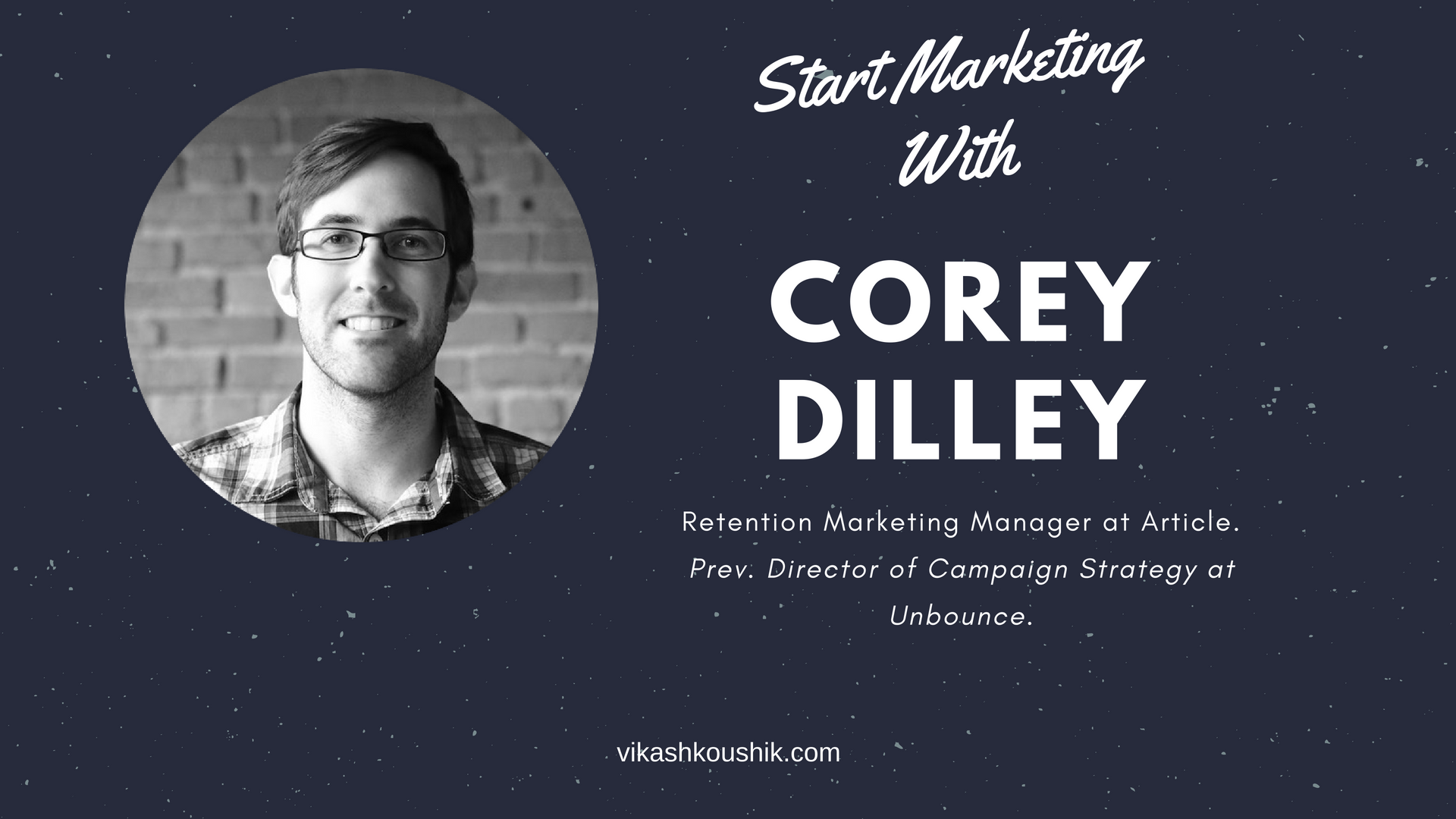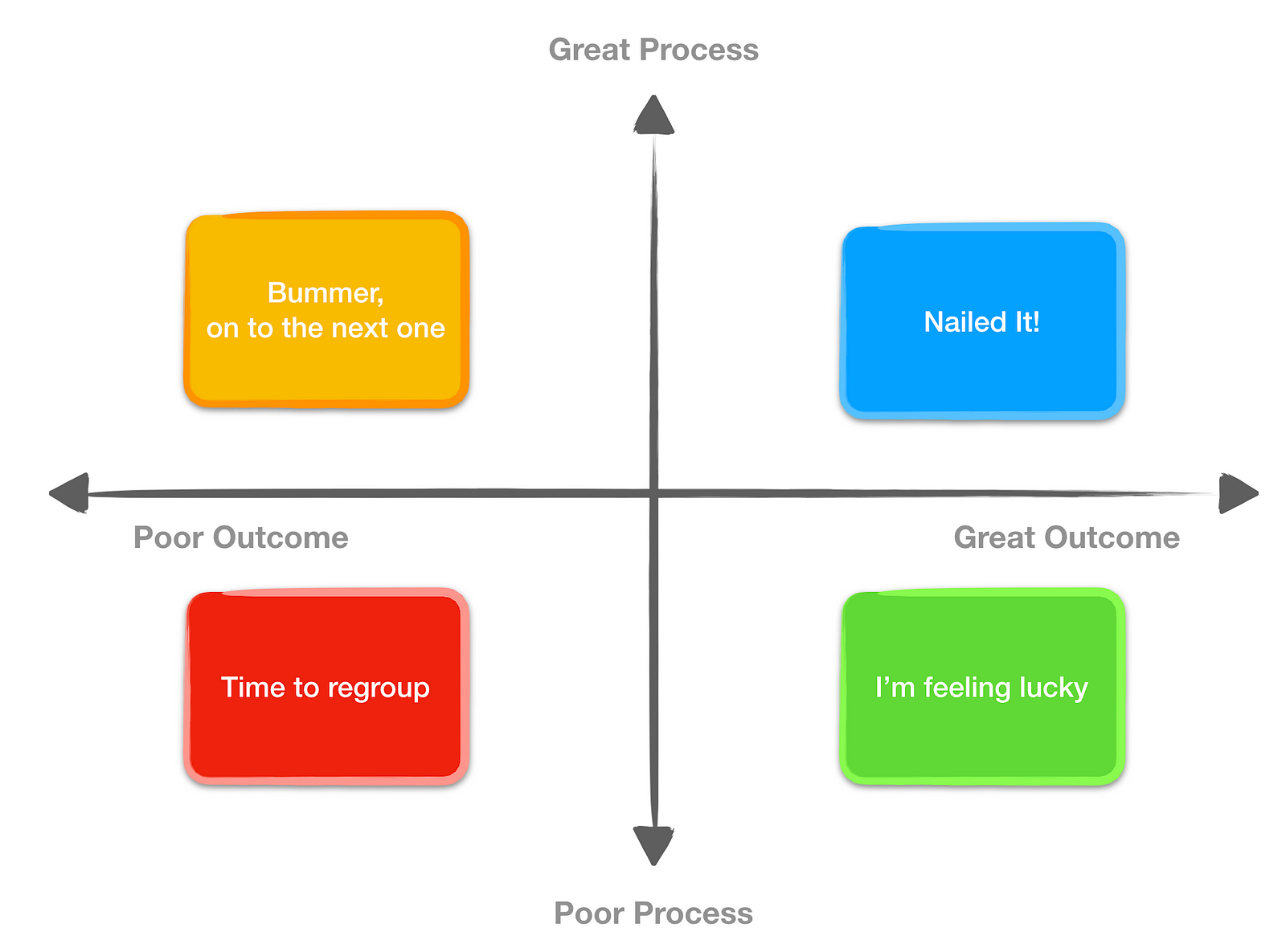Starting a Career in Marketing — Tips and Advice from Corey Dilley
How to start a career in marketing? Practical tips and advice from Corey Dilley, former Director of Campaign Strategy at Unbounce.

In 2011, after spending close to six years in Advertising, Corey Dilley did what most people with a good, full-time job, wouldn’t do.
He applied for a part-time job as a community manager for a yet-to-be-launched app called Eat St., all because he thought social media was going to be the next big thing.
His role during the first six months was to use social media and build a following for the app and the TV show it acted as a companion to. The app launched with a bang as they got to the top of their category on the app store, got featured by Apple in print ads, and had their app downloaded by over half a million people. And in the following months, he raised $250,000 from Bell Fund to further develop the app and sell ad space within the app advertiser-direct.
You’d think he learned all this at college. After all, he had a Diploma in Advertising. But when I asked him what skills he picked up before getting into his first job, he said:
“Basically none. I knew how to do school work.”
Corey wasn’t always into marketing or advertising. As a high school kid, he was into graphic design and wanted to learn more about ad design. And so after scouting for colleges he thought would help him pick up skills in designing ads, he joined Sheridan College and got his Diploma in Advertising. While the course taught a bit of what he wanted to learn, the main focus was on traditional advertising — print, radio, and TV ads. He nevertheless enjoyed the program, stuck it out, and got his first job as a TV ad buyer.
“At my first job as a TV ad buyer at PHD Canada, I had to be taught to take notes during meetings and how to prioritize a to-do list. It was embarrassing.”
Since then, he has managed campaigns for clients that include some of the well-known brands like Hershey’s, Red Bull, Expedia, and Audi, worked full-time at Unbounce, and is currently the Retention Marketing Manager at Article.
So, how did Corey, who didn’t take up career-related skills seriously and relied on his school to teach him everything he needed to know, manage to grow into one of the best marketing managers?
Side projects are your best friends
Corey spends his free time swinging his son around and playing video games with his wife. He’s the kind of person who enjoys learning a variety of things through books and courses, and considers himself as a generalist. Not being a specialist is something he has always been afraid of and often wishes he had deep expertise in data and analytics. “Usually, it’s not until you get into being a marketing manager that generalization becomes more of an asset, which means a generalist’s early years are more of a struggle”, he added.
While reading books and going through courses has helped him talk and work his way around in a variety of topics, the only way for him to truly learn something is by doing it. He says, when you get your hands dirty and actually try to do the work, it forces you to think through minute details and understand how things are connected in a way that courses and books can’t.
“Building a successful blog (or social media account, email newsletter, ad consultancy, etc.) on your own time is much more impressive than punching the clock for 2–3 years.”
Having a side project and being able to manage it is also an effective way to convince a boss to let you do something at your job. And if you’re someone who’s trying to make a switch within the company, start doing whatever it is you want to learn.
“If you want to learn JavaScript, for example, ask a JavaScript developer what a good project for a beginner would be, then use all the resources on the internet to execute that project. There is no lack of information anymore.”
Find a process that helps you inch closer to success
As someone with a broad set of skills, he spends a majority of his time thinking at a strategic level for his marketing campaigns. He says that it would’ve been helpful early on in his career to understand that marketing involves inspiring people to take action and that human beings are complex. So, nobody really knows what the right thing to do is. He says,
“Instead of trying to find what the right thing to do is, strive to find and hone a method or a framework that informs whether the things you’re doing are working or not, so you can make decisions that inch you closer and closer to success.”
To help us understand what he meant, Corey shared a blog post written by Tomasz Tunguz, a venture capitalist at Redpoint Ventures. In the post titled “Separating The Quality Of The Outcome And The Quality Of The Decision”, Tomasz goes into detail about the quality of outcome with a 2 x 2 matrix.

While everyone wants to stay in the top right corner of the matrix, Tomasz says most of us oscillate between “I’m feeling lucky”, a poor decision-making leads to a great outcome, and “Bummer, on to the next one,” when a good decision-making process leads to a poor outcome. “Focus on the process, because eventually the right process will lead to great outcomes”, Tomasz added.
“Success is a lagging indicator. Processes are proxy metrics, leading indicators of success. Processes establish some degree of repeatability in a world where chance roams freely.” ~ Tomasz Tunguz
Corey says, understanding this will force you to read tactical marketing advice with the knowledge that there’s plenty of variables involved, and the results may vary if you applied the same advice to your company.
Before letting him go, I asked him two more quick questions:
1. What’s the best advice you’ve received so far?
I’m not sure what the best piece is, but 3 things come to mind that has come up recently:
a. The whole lesson in Crossing The Chasm by Geoffrey Moore about honing in on a specific target market strategically, so that it sets you up to win over other target markets. Don’t try to market to too broad a target.
b. Every element of a marketing campaign has a single job. For example, the only job of an email subject line is to get people to open the email. An email’s headline or intro’s only job is to get people excited to read the body. And the body’s copy should compel people to click the link.
c. A company’s content should solve the same problem for the same target market as their product does.
2. What are some books, podcasts, blogs, and people you think anyone trying to get into marketing should follow?
i. Crossing the Chasm by Geoffrey Moore — Book
ii. A textbook that teaches marketing fundamentals (I don’t know one off the top of my head, but the fundamentals are important and knowledge of them is becoming rare)
iii. Seth Godin’s Startup School — Podcast
iv. Marketing Over Coffee — Podcast
v. The Marketing Companion — Podcast
At a time when most entry-level jobs require 3–5 years experience, the best way to start building your career is by doing it and finding a process that will inch you closer to your goal. After all, as Corey said, there is no lack of information.
If you found this post informative, share it with your network.